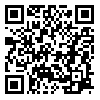Volume 14, Issue 4 (2-2021)
2021, 14(4): 66-84 |
Back to browse issues page
Download citation:
BibTeX | RIS | EndNote | Medlars | ProCite | Reference Manager | RefWorks
Send citation to:



BibTeX | RIS | EndNote | Medlars | ProCite | Reference Manager | RefWorks
Send citation to:
Rezvani Shakib M, Abdekhodaei Z. Describe and compare the experience of middle-aged people, of Covid-19 epidemic and quarantine conditions in the first and second peaks of the disease. Journal title 2021; 14 (4) :66-84
URL: http://rph.khu.ac.ir/article-1-3940-en.html
URL: http://rph.khu.ac.ir/article-1-3940-en.html
1- Shahid Beheshti University
2- Shahid Beheshti University ,z_abdekhodaei@sbu.ac.ir
2- Shahid Beheshti University ,
Abstract: (3545 Views)
The aim of this study was to describe and compare the lived experience of middle-aged people with the phenomenon of Covid-19 and quarantine experience in the first and second peaks of the disease. This qualitative study was done by descriptive phenomenological method. 10 middle-aged participants (41 to 65 years old) were chosen by purposive sampling method and interviewed in depth, during two peaks of corona in Iran. Data were saturated with 7 interviews and to make sure, 10 people were interviewed. Data obtained from the interviews were analyzed by the seven-step Colaizzi’s method. The present study achieved 10 main themes and 28 sub-themes. Key topics included first encounter, worries, beliefs, dealing, and the role of religion, family relationships, existential concerns, post-corona growth and the experience of infecting relatives. It seems that in the first peak of Corona, middle-aged people experienced anxiety, which over time, decreased by turning to religion, the principles of hygiene and avoidance. The remarkable point of the present study is that middle-aged people have experienced more acceptance of the crisis and the resulting situation than experiencing growth and change in the two corona peaks. In fact, middle-aged people try to adjust to their limitations and are less concerned about changing their lifestyle.
Type of Study: Research |
Subject:
Special
Received: 2021/01/24 | Accepted: 2021/11/23 | Published: 2021/12/11
Received: 2021/01/24 | Accepted: 2021/11/23 | Published: 2021/12/11
Send email to the article author
| Rights and permissions | |
 | This work is licensed under a Creative Commons Attribution-NonCommercial 4.0 International License. |





